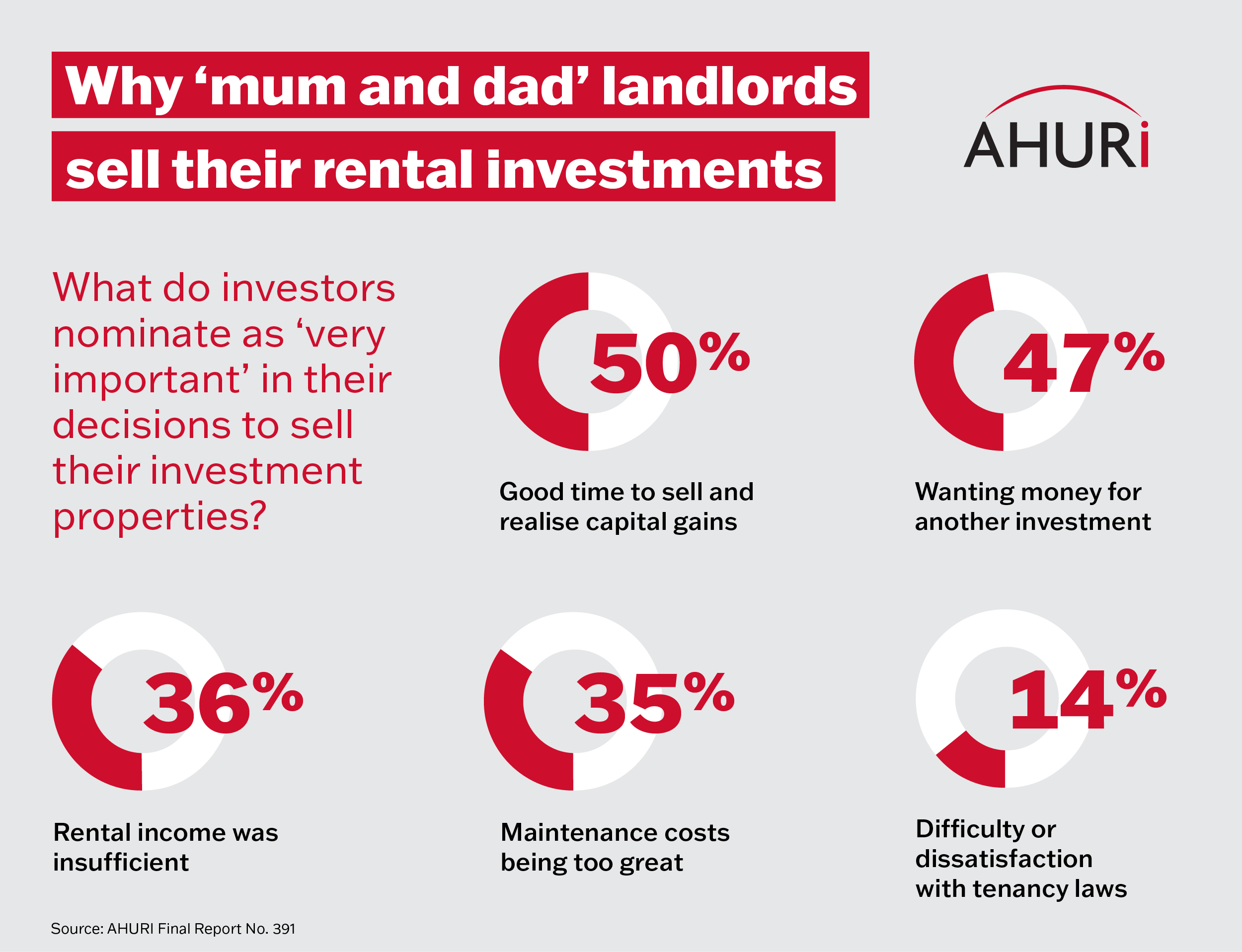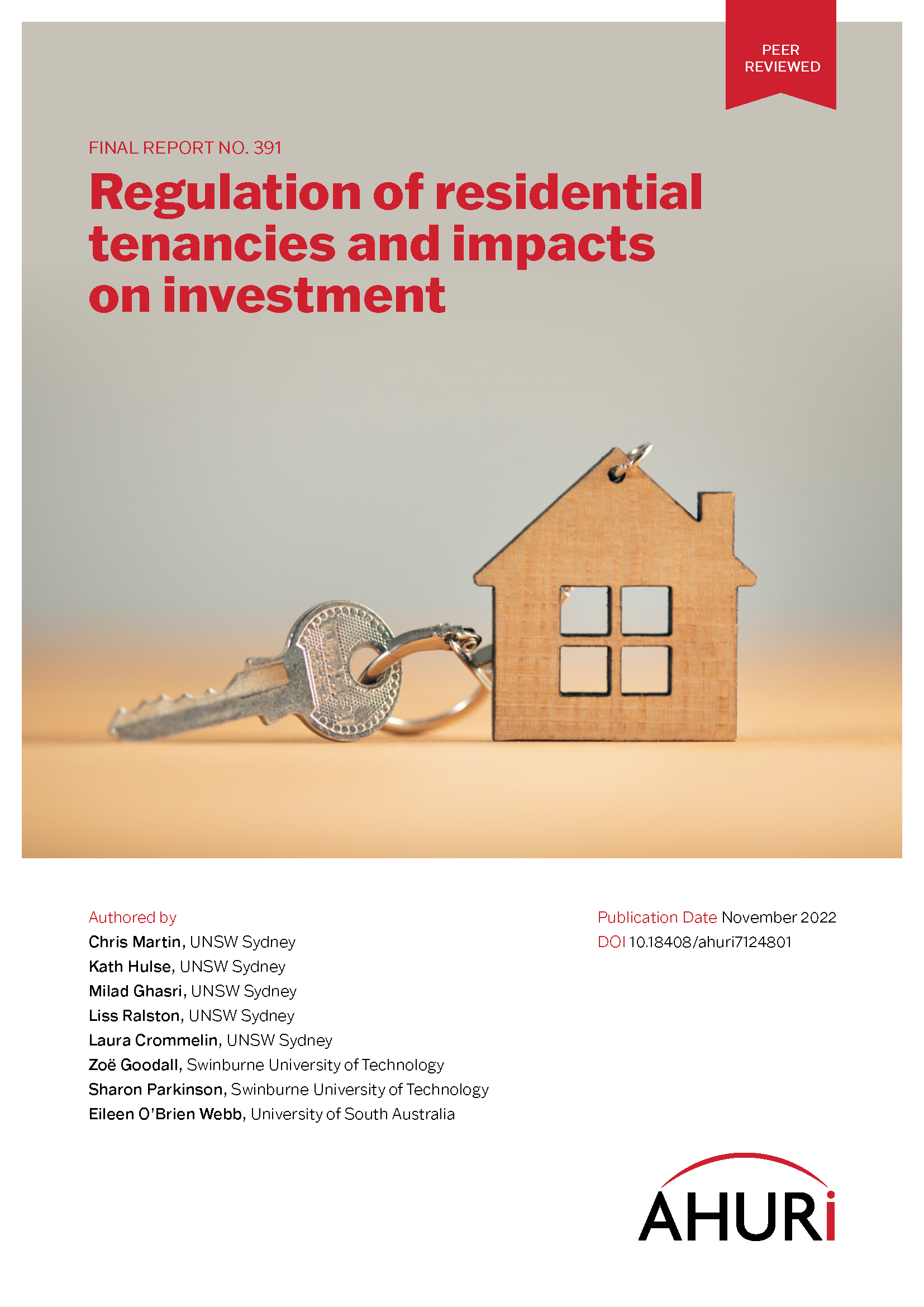
Improving tenancy laws hasn’t stopped rental investment
28 Nov 2022
Contrary to some predictions, tenancy law reforms in NSW and Victoria have had very little impact on landlords’ decisions to invest in, or stop investing in, private rental housing, new AHURI research reveals.
The research, ‘Regulation of residential tenancies and impacts on investment’, undertaken for AHURI by researchers from UNSW Sydney, Swinburne University of Technology and University of South Australia, examines what factors shape landlords’ rental investment decisions and presents options for national residential tenancies law reform.
The research analysed rental bond records to test two tenancy law reform interventions: the Residential Tenancies Act 2010 (NSW), and the 2015 Victorian Fairer Safer Housing review. The analysis found no evidence that the New South Wales reform affected the number of properties entering the private rental sector, while fewer properties than expected exited the sector. In the Victorian review, slightly fewer properties entered the sector after the review commenced, however there was no effect on numbers of properties exiting the private rental sector.
The research also surveyed property investors and found consistent results. Most investors said tenancy law was an important consideration when they invested, but when it came to selling it was rarely a major factor: only 14 per cent per cent of investors nominated dissatisfaction with tenancy laws as ‘very important’ in their decision to sell. By contrast, 50 per cent said they had sold because it was a good time to realise capital gains; 47 per cent said they wanted money for another investment; and 36 per cent said the rental income was insufficient.
'When investors decide to invest, prospective rental income and capital gains are the most important reasons, but tenancy laws are an important consideration too. On the other hand, tenancy laws do not figure strongly in reasons for disposing of investment properties.'

‘Overall, we found that Australian residential tenancies law reform has accommodated, even facilitated, the long-term growth of the private rental sector, rather than causing disinvestment’ says research lead author, Dr Chris Martin, Senior Research Fellow in the City Futures Research Centre at UNSW Sydney. ‘The sector is dominated by small-holding landlords who frequently transfer properties into and out of private rental according to their individual circumstances and the wider housing market conditions. The reality is the Australian private rental sector is built for both investing and disinvesting, and that’s what landlords do.’
The research found that within five years of first being in the private rental market, many properties in both Sydney and Melbourne are no longer in the rental market. In Sydney 32 per cent of properties that first entered the private rental sector in 2000 were no longer in the private rental sector five years later, and 44 per cent were no longer there 10 years later. In Melbourne, almost half (49.3%) were no longer in the sector five years later, 58 per cent were no longer there after 10 years. The situation is even worse for properties that first entered the private rental sector in 2015: in Sydney 54.7 per cent had exited after five years and in Melbourne 51.4 per cent had exited.
‘As properties churn through the rental sector, renters get churned out of their housing’ said Dr Martin. ‘This is a basic problem for people trying to make a home in rental housing.’
‘Around Australia, states’ and territories’ renting laws accommodate the dynamic nature of private rental investment’ said Dr Martin. ‘Landlords can access the sector easily because there are no licensing or training requirements. And they can exit easily because tenancies can be readily terminated.’
‘There are, however, many differences between jurisdictions in the details of their laws. There’s been virtually no national co-ordination of law reform processes, so divergences are opening up and some problem areas have gone unaddressed’ said Dr Martin.‘ Based on the findings of our report, we argue it is time for jurisdictions across Australia to pursue a new national agenda for residential tenancies law reform,’ says Dr Martin. ‘Some high-priority actions should include making tenancies more legally secure, clarifying landlords’ obligations regarding defective premises, and investigating contemporary rent regulation regimes to moderate increases in market rents.’


